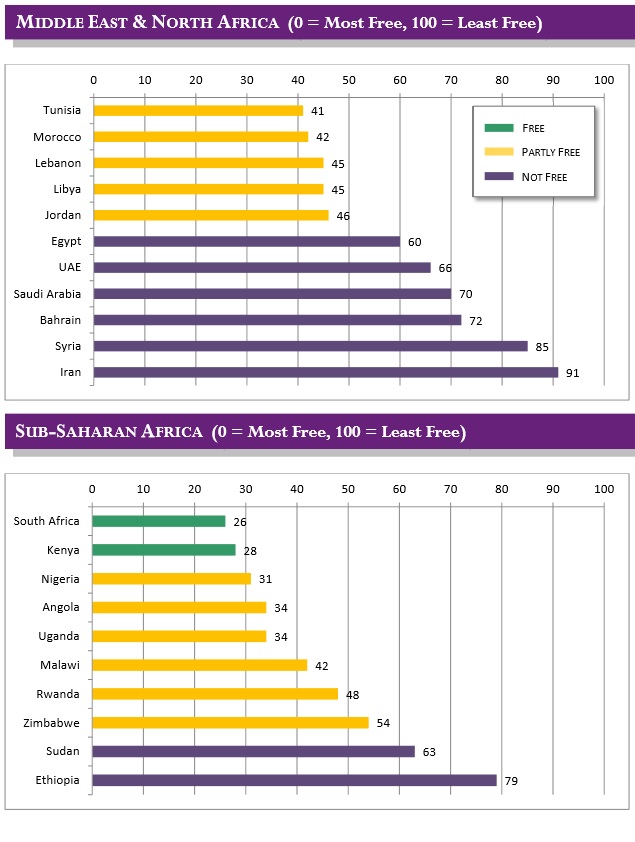Report finds online freedom in Kenya and in South Africa, the opposite in Ethiopia and in Sudan
Of fourteen African nations surveyed from May 2012 through April 2013, only two (Kenya and South Africa) were found to have true online freedom. Sudan and Ethiopia were found to lack it. The findings for Africa come as no surprise and serve as a good general overview of legal trends.
In its entirety, the Freedom On The Net 2013 report identifies key trends in internet freedom in 60 countries (up from 47 last year). The study, published by Freedom House, finds that many governments are still keen on blocking and filtering opposing online viewpoints. Authorities are also more likely than ever to arrest individuals who post critical comments on social media sites. Fortunately, activists have become better at raising awareness of threats to online freedom.
Globally, a staggering 34 of 60 nations assessed experienced a decline in internet freedom since 2012 (up from twenty during 2011). Approximately half of nations broadened technical or legal surveillance and 40% adopted legislation that threatened online freedom.
The report notes that all 10 Sub-Saharan African nations increased online monitoring efforts in the past year as surveillance technologies became more readily available. An increase in monitoring does not necessarily mean an overall decline in internet freedom, however.
Within Africa, South Africa and Kenya are again considered to be ‘free’. In descending order of freedom, Nigeria, Angola, Uganda, Tunisia, Malawi, Morocco, Libya, Rwanda, Zimbabwe, and Egypt fall in the ‘partly free’ region. Sudan and Ethiopia are considered ‘not free’. Ethiopia, Libya and Egypt experienced slight score declines. Tunisia’s score again increased by a large amount (5 points). Rwanda saw a modest increase. Nigeria and Kenya had minor score improvements. Data is lacking for the vast majority of African countries (likely due to resources – the current report is 888 pages long with only 60 nations covered).
Country reports
Angola:
- Few limits on content, but violations of user rights
- State security may be planning to employ an electronic monitoring system with assistance from Germany
- An online journalist for VOA was assaulted in December 2012
- Good news: parliamentary elections in August 2012 saw greater transparency through social media tools
Egypt:
- Arrests of bloggers are relatively common, especially for insulting the president or insulting religion
- Mobile service is reportedly throttled by authorities in areas around protests
- Anti-Muslim Brotherhood and anti-government Facebook group admins were targeted by abductions and killings
Ethiopia:
- Limits on content and obstacles to access remain very high
- The government has strengthened technological means of monitoring and blocking the internet with the help from the Chinese
- A law enacted in July 2012 limited certain telecom services (instances of VoIP)
- Multiple individuals were prosecuted for online activities
Kenya:
- The main concern is limitations on hate speech (equipment to monitor online hate speech was installed in December 2012)
- Elections saw a generally free flow of social media and text messages but some inflammatory ones were blocked
- A handful of bloggers were arrested but none were found guilty of a crime
- Two bills that enhance online freedom are making their way through the necessary channels
Libya:
- Surveillance equipment from the old regime are reportedly still online and oversight is lacking
- A lack of telecoms privatization is worrisome (although this is improving)
Malawi:
- Online freedom has improved under Joyce Banda
- A draft e-law will help regulate ICTs
- Mobile phone companies may begin monitoring in the coming year
Morocco:
- The government loosened its online monitoring following the Arab Spring (but some limits on content remain)
- Online media is largely censored as a result of restrictive laws
- Users have been arrested for posting comments to Facebook and YouTube
Nigeria:
- The Federal Government was considering online monitoring as of early 2013
Rwanda:
- Independent online news sites have been inaccessible at times (reasons unclear)
- Changes to media laws may or may not help online journalists
South Africa:
- Limits on content are scarce
- FinFisher spyware was found on the Telkom network in April 2013 but may have always been idle
Sudan:
- Protests in June 2012 resulted in a major crackdown on online privacy
- Anti-government content is monitored by the NISS
- Online information (ie. that of journalists) is often manipulated
- Bloggers and journalists have been arrested during times of protest
- A draft law could limit the freedom of online media
Tunisia:
- Limits on content are scarce and online monitoring is gone
- New laws protect online journalists but old laws still exist for other means of online expression
- Online users still face arrest for anti-Islam comments
Uganda:
- Content is reportedly not filtered
- SIM registrations posed privacy concerns
- The government may be increasing online surveillance (facts aren’t yet entirely clear)
Zimbabwe:
- The ruling Zanu-PF wished to have more control over ICTs before July 2013 elections
- The reaction to the ‘Baba Jukwa’ Facebook page that exposed government secrets made clear the Zanu-PF wishes to control online content to some extent
- A cyber training program facilitated by Iranian intelligance is worrisome
- Mobile users were arrested for insulting the president
Visit the official site for an overview, summary of findings, detailed country reports, maps, and more.













 Twitter
Twitter Facebook
Facebook Pinterest
Pinterest